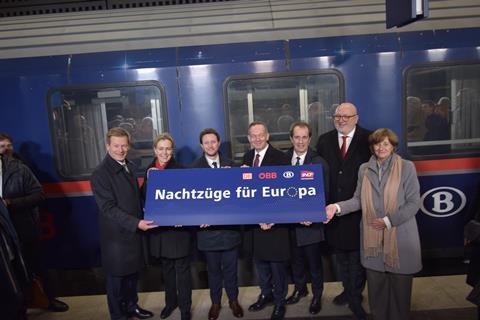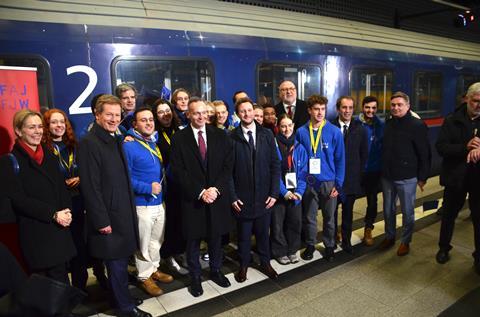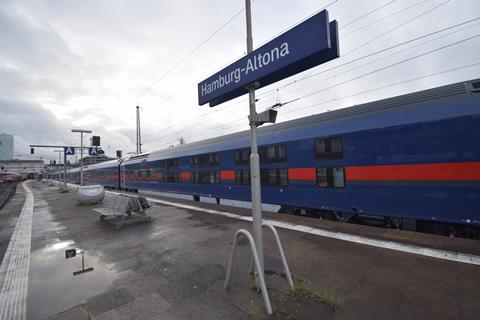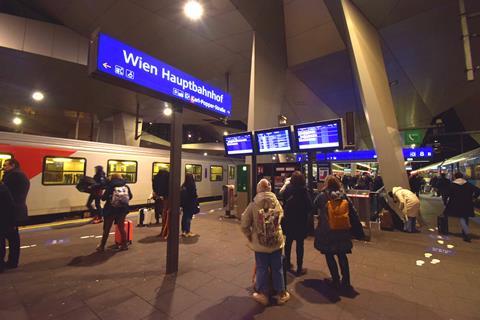
EUROPE: Austrian Federal Railways launched its next-generation fleet of Nightjet overnight trains into service on December 10 when the first trains formed of new Siemens Mobility rolling stock ran on the Wien/Innsbruck – Hamburg route.
The two portions, each comprising a single push-pull trainset, were joined at Nürnberg, running in a 14-car formation from there to Hamburg-Altona. However, the train was delayed by various incidents en route and arrived in Hamburg around 3 h late.
Among the design features of the fleet are sleeping compartments which have their own toilet and shower facilities, and ‘mini-cabins’, offering private individual sleeping pods in the couchette cars. These have lockers for hand luggage and shoes, and a sliding folding table for breakfast.
Following the launch of the new trains, on December 11 the first overnight train in nine years ran between Berlin, Brussels and Paris using ÖBB’s legacy Nightjet cars. A ceremonial departure in Berlin was attended by the transport ministers of Germany, Belgium, France and Austria, as well as the four CEOs of the participating railways.
Politicians welcome revival

German Transport Minister Volker Wissing welcomed the relaunch of the service, emphasising that ‘today is a good day for all travellers who will benefit from the new rail connections between the European capitals in the future. This new offer is thanks to the close co-operation of all those involved, who have formed a true night train alliance and are thus implementing our TEE 2.0 concept into concrete offers for travellers. I am convinced that we need more team play on the railways in Europe in order to make rail even more attractive in the competition between modes of transport.’
Manja Schreiner, Berlin State Senator for Mobility, Climate Protection & the Environment added that ‘three great European capitals — Berlin, Brussels and Paris — are now connected to each other in a comfortable and climate-friendly way. May other European metropolises soon be accessible by night train from Berlin.’
Austrian Transport Minister Leonore Gewessler said that ‘travelling by train means protecting the climate. This is particularly true for the night train, which also allows you to travel practically and comfortably. With the new Nightjet connections, important European cities are growing together. This is the future of our mobility. Short and medium-haul routes in Europe belong to trains.’
Georges Gilkinet, Belgian Deputy Prime Minister & Minister for Transport, emphasised that his government would ‘do its part. We will offer financial support to all transport companies that travel to Belgium with their night trains. No means of transport is more environmentally friendly than rail.’
His French counterpart Clément Beaune said the revival of the Paris – Berlin train was ‘the culmination of a commitment that I have had for three years. A highlight for Europe and ecology. This train is the image of European co-operation responding to the climate emergency and the need to connect peoples. Our ambition is great: we will open more routes in France and Europe over the course of this decade, we will buy and renovate night trains. The night train is no longer a symbol of the past, it is the image of the future.’
Incumbents promise investment

SNCB Chief Executive Sophie Dutordoir invoked the memory of Georges Nagelmackers, ‘the founder of the legendary Compagnie des Wagons-Lits’, insisting that ‘night trains have been an integral part of Belgian railway history. When ÖBB revived night train services at the beginning of 2020, we at SNCB were very keen to support the initiative to connect other European capitals and metropolises to Brussels via long-distance train connections — be it during the day or at night. SNCB contributes to this with maintenance services, train staff on the Belgian section and ticket sales through our own sales channels.’
Christophe Fanichet, CEO of SNCF Voyageurs, said the French incumbent was ‘proud of the new night train connection, which strengthens our route network across Europe. The Paris – Berlin route is a new strong symbol of the revival of night trains, made possible with financial support from the French government. ÖBB, DB, SNCB and SNCF Voyageurs have decided to join forces for a common goal: the expansion of rail connections in Europe.’

Speaking to Railway Gazette International, ÖBB Chief Executive Andreas Matthä looked ahead to the delivery of all 33 Siemens Nightjet trainsets the operator has ordered. ‘We are undertaking the largest procurement programme in the segment of the night trains, and more than €700m is being invested. Now we need to consolidate the network over the next few years and serve some of the routes with more capacity. But when in 2026 all 33 new Nightjets are in service, we’ll keep most of the existing night fleet for additional capacity.’
Looking at the next steps for the brand, ÖBB’s Head of Long-Distance Passenger Services Kurt Bauer said the company expected to receive 14 more Nightjet trainsets by September 2024. These will operate from Wien to Hamburg, Innsbruck to Hamburg, on domestic routes from Wien to Bregenz, and from Wien and München to Roma from Q3 2024. However, the trains will not be able to run in push-pull mode using their driving trailer cars until the approval process is completed, which Bauer expects in 2025.

















